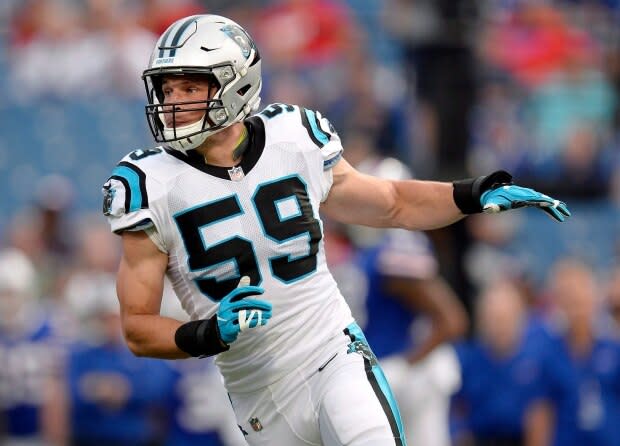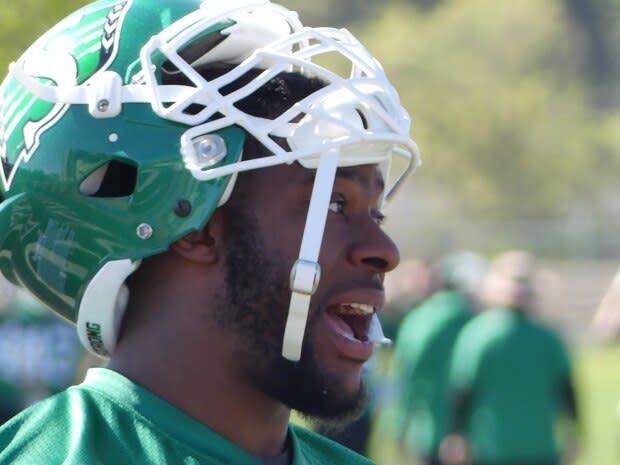Pair of high school football teams wearing collars in hopes of reducing concussions
Two high school teams in the province have added a piece of equipment they hope will reduce concussions this season.
All players from Moose Jaw's Central Collegiate Cyclones and Wynyard's Composite High School Golden Bears will be wearing a Q-Collar this season.
Q30 Innovations, which makes the collar, says it "applies slight pressure to the neck which mildly increases blood volume in the brain to create a cushion that may reduce movement of the brain inside the skull."
"It [puts] about a pound-and-a-half of pressure on each side of the neck, which leaves back about a teaspoon-and-a half of blood in the cranial cavity and it doesn't allow the brain to slosh," said Sask Selects Football director Zeljko Stefanovic, who is also a representative for the company in Saskatchewan.
"So if they can stop the brain from moving, they can stop the brain from being injured."

The product has been in development for a number of years — it was formerly known as NeuroShield — and is available to the public in Canada. The company has conducted a number of studies that indicate the collar may help reduce concussions, but Football Canada says the product requires more research.
"There is no research evidence currently that the Q Collar prevents concussion," executive director Shannon Donovan said in an email to Football Saskatchewan.
"We also don't know if this type of product is risk-free as that has not been fully researched, either. Our general response to sport organizations is that there is no justification to purchase this device until further research shows clear evidence that it reduces the risk of concussion and is not associated with any long-term side effects."
The collars are catching on, regardless. CFL players who wear the collars include Winnipeg's Adam Bighill and Saskatchewan's Charleston Hughes.
Test run in Texas
Stefanovic had about 100 players from the 14-under and 16-under teams in his winter program wear the devices.
They went down to San Antonio, Texas, for a football tournament and he said they had positive results with the collar.
"It was the first time we'd ever actually come back in San Antonio without having a single brain injury, which was huge for us."
That convinced Central Collegiate Cyclones head coach Colin Belsher, who has two young sons who play football, to outfit the senior team with the collars this season.
Belsher said they have been doing baseline testing on players for concussions and follow the protocols set out by Football Canada and Football Saskatchewan.
"So I thought, you know, what's one more tool to try and help prevent the possibility of a concussion?"
The players have been wearing the collars for about a week now and he said the response has been positive, though it takes a couple of days to get comfortable.

"But it's just a matter of getting used to having that little bit of pressure on your neck for the kids to get used to while they're playing," Belsher said.
"For the most part the kids now understand it's a piece of equipment they're going to be wearing and most of them don't even realize they're wearing it anymore."
Wynyard Golden Bears head coach Morris Sokul said a local doctor and physiotherapist recommended they look into the collars.
They fundraised in the community and were able to outfit the 25 members of the senior team and are now looking to get the Grade 6-9 players a Q-Collar, which retails for $250.
Sokul said the device isn't going to eliminate concussions, but this may help reduce them.
"At the end of the day we want to make sure that the kids don't get hurt and whatever we can do that's in our power to help protect the kids, we try it," added Stefanovic.
"I truly think that within a year or two this is going to be this is this is going to be mandatory equipment, just like the neck guard has been in hockey and a face mask in football for that matter."


